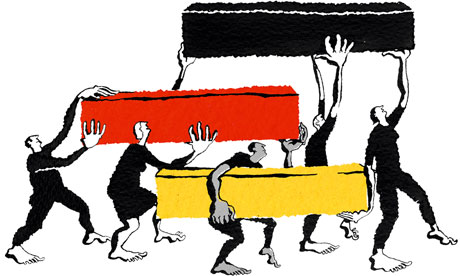Employment lawyer Philip Landau looks at some of the more common misconceptions about workers' contractual rights

Staff who familiarise themselves with their contract early on can avoid any nasty surprises further down the line. Photograph: Getty Images
Many workers are not aware of their contractual rights. Their written contract of employment (assuming they have one) is often only read in passing and they are consequently surprised – whether positively or negatively – when they have to rely on it. Here are several things that workers commonly believe, but are not actually true:
All the terms of my employment are set out in writing in my contract
A contract of employment is not necessarily one document; it can incorporate terms from a number of different sources, and can be written or verbal.
Express terms are those that are explicitly agreed between the parties (written or verbal), such as your hours of work, job description, notice, wages and sick pay. These terms could be found in a number of different documents such as a written statement of employment particulars, staff handbook, the job advertisement, payslips or, of course, the written employment contract itself.
Certain terms and conditions can also be implied into a contract of employment by common law or custom and practice. For example, both employer and employee have duty, trust and confidence implied into every relationship. If that fundamental trust is breached, a right of action could follow (in an employee's case, this would be a constructive dismissal claim). Other examples of an implied term can include an employer's decision to pay a bonus every year, or an enhanced redundancy pay, which could give rise to a custom and practice to receive such benefits.
My employer can't force me to relocate against my wishes
Yes, it can if you have a "mobility clause" written into your contract of employment. This would entitle it to move you to another location within the limits set out in the contract (unless your employer is acting unreasonably).
If you refuse to move, your employer may be able to avoid paying you redundancy.
If you do not have a mobility clause in your contract, you can generally refuse to move and still be entitled to receive redundancy payment. However, if the relocation is just a short distance (say a few miles) you could still lose this if you are seen to have unreasonably refused this suitable alternative employment.
My employer cannot vary the terms of my contract without my consent
Your consent may, in fact, have already been given when you entered into your contract of employment as there may be an express right reserved for your employer to make the required changes (a flexibility clause). This could apply, for example, to a change in job role or hours of work.
Such clauses are construed narrowly by the courts and your employer must act reasonably, but an employer will be in a far stronger position if the contract allows them to make this change. You may also have "impliedly" given your consent, especially if the imposed change is of immediate practical effect (such as a pay cut or change in commission structure) and you have continued to work without objection after the change. In these circumstances, there is unlikely to be a breach of contract by your employer.
My employer has to pay my outstanding bonus when I leave
If there is a clause in your contract of employment (which there often is) stating that you must be employed and not under notice "as at the bonus payment date", you may lose your bonus entitlement when you leave. Many are caught out when they resign and not aware of this clause.
Some employers purposefully choose to fast-track you out of the business to avoid you being employed at the bonus payment date – even if you have worked the full preceding year. They can do this by placing you on notice or making a payment under "pay in lieu of notice clause" in your contract. This is especially the case with bankers' bonuses, even where the announcement to make the bonus payments had been made many months beforehand.
I can work my notice when I leave my job
Once you resign or are given notice, you may think you would usually work that notice period. But assuming your employer has reserved the right in your contract, you could also be paid in lieu of your notice or put on garden leave.
Many individuals want to work for as long as possible as they consider prospective employers have more of a preference for candidates that are still employed. But employers will often want to cut ties early once a termination is on the cards – and pay in lieu of notice. You can't object.
If your employer elects to put you on garden leave, you are not required to attend work for the period of your notice, but are still contractually bound to your employer so cannot start a new job either. This is likely to have a greater impact, of course, if you have a longer period of notice.
It is always good to familiarise yourself with your employment contract so you can make the dealings with your employer work to your advantage when you need to. Or even better, try and negotiate more favourable terms before you sign it, as it will invariably be too late otherwise.
Are you familiar with the terms of your contract of employment? Have you ever regretted agreeing to certain terms or been surprised about what it contained?








